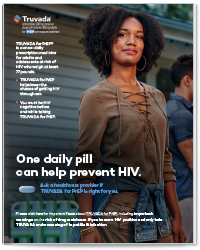
What is DESCOVY for PrEP®?
- It is not for use in people assigned female at birth who are at risk of getting HIV from vaginal sex, because its effectiveness has not been studied.
- You must be HIV-negative before and while taking
DESCOVY for PrEP.
Talk to a healthcare provider about your risk for HIV and if DESCOVY for PrEP may be an option for you.
Please tapclick below, or scroll for Important Safety Information about
What is TRUVADA for PrEP®?
To help determine if
Please tapclick below, or scroll for Important Safety Information about

What is TRUVADA for PrEP®?
To help determine if
Please tapclick below, or scroll for Important Safety Information about
Please see Important Facts about
Important Safety Information
What is the most important information I should know about DESCOVY for PrEP ?
Before and while taking
- You must be
HIV-negative before you start and while takingDESCOVY for PrEP . You must get tested forHIV-1 immediately before and at least every 3 months while taking DESCOVY. If you think you were exposed toHIV-1 , tell your healthcare provider right away. They may want to do more tests to confirm that you are stillHIV-negative . - Many
HIV-1 tests can missHIV-1 infection in a person who has recently become infected. Tell your healthcare provider if you had a flu-like illness within the last month before starting or while taking DESCOVY. Symptoms of newHIV-1 infection include tiredness, fever, joint or muscle aches, headache, sore throat, vomiting, diarrhea, rash, night sweats, and/or enlarged lymph nodes in the neck or groin. - DESCOVY by itself is not a complete treatment for
HIV-1 . Do not takeDESCOVY for PrEP unless you are confirmed to beHIV-1 negative. - DESCOVY does not prevent other sexually transmitted infections (STIs). Practice safer sex by using a latex or polyurethane condom to reduce the risk of getting STIs.
- To further help reduce your risk of getting
HIV-1 :- Do not miss any doses of DESCOVY. Missing doses may increase your risk of getting
HIV-1 . - Know your HIV status and the HIV status of your partners. If your partner is living with HIV, your risk of getting HIV is lower if your partner consistently takes HIV treatment every day.
- Get tested for other STIs. Some STIs make it easier for
HIV-1 to infect you. - Talk to your healthcare provider about all the ways to help reduce HIV risk.
- Do not miss any doses of DESCOVY. Missing doses may increase your risk of getting
DESCOVY can cause serious side effects:
- Worsening of hepatitis B (HBV) infection. Your healthcare provider will test you for HBV. If you have HBV and stop taking DESCOVY, your HBV may suddenly get worse. Do not stop taking DESCOVY without first talking to your healthcare provider, as they will need to check your health or give you HBV medicine.
Who should not take DESCOVY for PrEP ?
Do not take
- Already have
HIV-1 or if you do not know yourHIV-1 status. If you haveHIV-1 , you need to take other medicines with DESCOVY to treatHIV-1 . If you haveHIV-1 and take only DESCOVY, yourHIV-1 may become harder to treat now and in the future.
What are the other possible side effects of DESCOVY for PrEP ?
Serious side effects of DESCOVY may also include:
- Kidney problems, including kidney failure. Your healthcare provider should do blood and urine tests to check your kidneys before and during treatment with DESCOVY. If you develop kidney problems, your healthcare provider may tell you to stop taking DESCOVY.
- Too much lactic acid in your blood (lactic acidosis), which is a serious but rare medical emergency that can lead to death. Tell your healthcare provider right away if you get these symptoms: weakness or being more tired than usual, unusual muscle pain, being short of breath or fast breathing, stomach pain with nausea and vomiting, cold or blue hands and feet, feel dizzy or lightheaded, or a fast or abnormal heartbeat.
- Severe liver problems, which in rare cases can lead to death. Tell your healthcare provider right away if you get these symptoms: skin or the white part of your eyes turns yellow, dark "tea-colored" urine, light-colored stools, loss of appetite for several days or longer, nausea, or stomach-area pain.
Common side effects in people taking
What should I tell my healthcare provider before taking DESCOVY for PrEP ?
- All your health problems. Be sure to tell your healthcare provider if you have or have had any kidney or liver problems, including hepatitis.
- All the medicines you take, including prescription and over-the-counter medicines, vitamins, and herbal supplements. DESCOVY may interact with other medicines. Keep a list of all your medicines and show it to your healthcare provider and pharmacist when you get a new medicine.
You are encouraged to report negative side effects of prescription drugs to the FDA. Visit www.fda.gov/medwatch, or call .
Please see Important Facts about
Important Safety Information
What is the most important information I should know about TRUVADA for PrEP?
Before and while taking
- You must be HIV negative before you start and while taking
TRUVADA for PrEP. Do not take TRUVADA to reduce the risk of getting HIV-1 unless you are confirmed to be HIV negative.- Get tested for HIV-1 immediately before and at least every 3 months while taking TRUVADA.
- If you think you were exposed to HIV-1, tell your healthcare provider right away. They may do more tests to confirm that you are still HIV negative.
- Many HIV-1 tests can miss HIV-1 infection in a person who has recently become infected. Tell your healthcare provider if you had a flu-like illness within the last month before starting or at any time while taking TRUVADA.
- Symptoms of new HIV-1 infection include tiredness, fever, joint or muscle aches, headache, sore throat, vomiting, diarrhea, rash, night sweats, and/or enlarged lymph nodes in the neck or groin.
- TRUVADA by itself is not a complete treatment for HIV-1. Do not take
TRUVADA for PrEP unless you are confirmed to be HIV-1 negative. - To further help reduce your risk of getting HIV-1:
- Do not miss any doses of TRUVADA. Missing doses may increase your risk of getting HIV-1 infection.
- Know your HIV status and the HIV status of your partners. If your partner is living with HIV, your risk of getting HIV is lower if your partner consistently takes HIV treatment every day.
- Get tested for other sexually transmitted infections. Some STIs make it easier for HIV-1 to infect you.
- Talk to your healthcare provider about all the ways to help reduce HIV risk.
- If you do become HIV-1 positive, you need more medicine than TRUVADA alone to treat HIV-1. TRUVADA by itself is not a complete treatment for HIV-1. If you have HIV-1 and take only TRUVADA, your HIV-1 may become harder to treat now and in the future.
TRUVADA can cause serious side effects:
- Worsening of hepatitis B (HBV) infection. Your healthcare provider will test you for HBV. If you have HBV and stop taking TRUVADA, your HBV may suddenly get worse. Do not stop taking TRUVADA without first talking to your healthcare provider, as they will need to monitor your health.
Who should not take TRUVADA for PrEP?
Do not take
- Already have HIV-1 infection or if you do not know your HIV-1 status. If you have HIV-1, you need to take other medicines with TRUVADA to treat HIV-1. TRUVADA by itself is not a complete treatment for HIV-1. If you have HIV-1 and take only TRUVADA, your HIV-1 may become harder to treat now and over time.
What are the other possible side effects of TRUVADA for PrEP?
Serious side effects of TRUVADA may also include:
- Kidney problems, including kidney failure. Your healthcare provider should do blood and urine tests to check your kidneys before and during treatment with TRUVADA. If you develop kidney problems, your healthcare provider may tell you to stop taking TRUVADA.
- Too much lactic acid in your blood (lactic acidosis), which is a serious but rare medical emergency that can lead to death. Tell your healthcare provider right away if you get these symptoms: weakness or being more tired than usual, unusual muscle pain, being short of breath or fast breathing, stomach pain with nausea and vomiting, cold or blue hands and feet, feel dizzy or lightheaded, or a fast or abnormal heartbeat.
- Severe liver problems, which in rare cases can lead to death. Tell your healthcare provider right away if you get these symptoms: skin or the white part of your eyes turns yellow, dark "tea-colored" urine, light-colored stools, loss of appetite for several days or longer, nausea, or stomach-area pain.
- Bone problems, including bone pain, softening, or thinning, which may lead to fractures. Your healthcare provider may do tests to check your bones.
Common side effects in people taking
What should I tell my healthcare provider before taking TRUVADA for PrEP?
- All your health problems. Be sure to tell your healthcare provider if you have or have had any kidney, bone, or liver problems, including hepatitis.
- If you are pregnant or plan to become pregnant. It is not known if TRUVADA can harm your unborn baby. If you become pregnant while taking
TRUVADA for PrEP , tell your healthcare provider. - If you are breastfeeding (nursing) or plan to breastfeed. Do not breastfeed if you think you may have recently become infected with HIV. HIV can be passed to the baby in breast milk. Talk to your healthcare provider about the risks and benefits of breastfeeding while taking
TRUVADA for PrEP. - All the medicines you take, including prescription and over-the-counter medicines, vitamins, and herbal supplements. TRUVADA may interact with other medicines. Keep a list of all your medicines and show it to your healthcare provider and pharmacist when you get a new medicine.
- If you take certain other medicines with TRUVADA, your healthcare provider may need to check you more often or change your dose. These medicines include certain medicines to treat hepatitis B or C infection.
You are encouraged to report negative side effects of prescription drugs to the FDA. Visit www.FDA.gov/medwatch, or call
Please see Important Facts about


Worried about cost? Insurance or no insurance, Gilead's Advancing Access® program may be able to help. Visit GileadAdvancingAccess.com to learn more.


